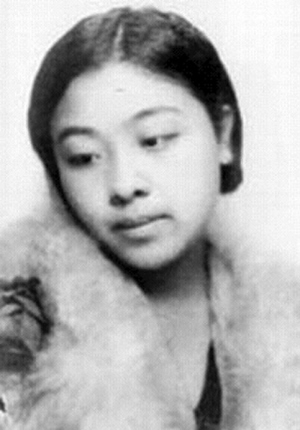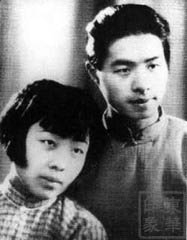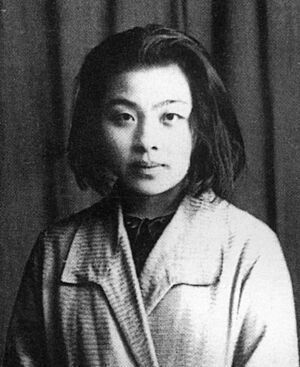Ding Ling facts for kids
Quick facts for kids
Ding Ling
丁玲 |
|
|---|---|
 |
|
| Born | Jiang Bingzhi 12 October 1904 Linli, Hunan, China |
| Died | 4 March 1986 (aged 81) Beijing, China |
| Occupation | Writer |
| Language | Chinese |
| Notable works | Miss Sophia's Diary The Sun Shines over the Sanggan River |
| Spouse | Hu Yepin Feng Da Chen Ming |
| Children | Hu Xiaopin |
Ding Ling (Chinese: 丁玲; pinyin: Dīng Líng; born October 12, 1904 – died March 4, 1986) was a famous Chinese writer. Her real name was Jiang Bingzhi. She was one of the most celebrated women authors in China during the 20th century.
Ding Ling was known for her stories that supported women's rights and showed real-life struggles. She wrote about how society was changing in China. She was also involved with the Chinese Communist Party. Because of her political views, she was even put in prison by the Chinese Nationalist Party.
Later, she became a leader in the writing community in Yan'an, a Communist base. She held important roles in the early government of the People's Republic of China. In 1951, she won the Stalin second prize for Literature for her book The Sun Shines Over Sanggan River. However, in 1958, she was criticized and sent away to a distant place called Manchuria. She was finally allowed to return in 1979. Ding Ling passed away in Beijing in 1986.
Contents
Early Life and Education
Ding Ling was born into a wealthy family in Linli, Hunan province. Her father, Jiang Baoqian, was a scholar who died when she was only three years old. Her mother, Yu Manzhen, was a strong woman who studied at a special school for girls. She became an elementary school teacher and raised her children by herself.
Ding Ling's mother was a big inspiration for her. Ding Ling even started writing a novel about her mother's life. Following her mother's example, Ding Ling became an activist at a young age.
She went to progressive girls' schools in Hunan and Shanghai. In 1919, she finished primary school. She then joined a school where she learned about the May 4th student movement, which was a big protest movement in China. She moved to different schools, always looking for a place that encouraged new ideas. In 1922, she moved to Shanghai and started using the pen name Ding Ling.
In Shanghai, she met her future husband, Hu Yepin. He was a writer and editor. Ding Ling wanted to be free and not tied down by marriage. But she and Hu Yepin became very close friends and lived together.
Writing and Political Involvement
In 1927, Ding Ling published her first novel, "Meng Ke." It was about a young woman's struggles in Shanghai. This book showed her early interest in women's issues.
In 1928, she published Miss Sophia's Diary. This book became very popular. It was about a young woman who felt unhappy and confused about her romantic feelings. The story showed Ding Ling's support for the "New Woman" movement in China. This movement encouraged women to be independent and have their own thoughts.
Ding Ling and Hu Yepin moved to Shanghai. They started a publishing house and a magazine. They faced financial difficulties. In 1929, Ding Ling wrote "Wei Hu," a novel based on a friend's love story.
In 1930, Hu Yepin started teaching in Jinan and became interested in Marxism-Leninism, a political idea. This caught the attention of the Kuomintang. Ding Ling and Hu Yepin had to flee back to Shanghai. They joined the League of Left-Wing Writers, which was connected to the Communist Party. In November 1930, Ding Ling gave birth to her son, Jiang Zulin. He was raised by her mother.
On January 17, 1931, Hu Yepin was arrested by the Kuomintang government. He was killed on February 7. Ding Ling was heartbroken. She sent her baby son to her mother in Hunan. Later, she joined the Chinese Communist Party in 1932. She became an important leader in the League of Left-Wing Writers.
Imprisonment in Nanjing
In May 1933, Ding Ling was arrested by the Kuomintang government. She was secretly held under house arrest in Nanjing. For a long time, her friends thought she was dead.
In September 1933, Ding Ling wrote a note. She hoped it would help her get free. In the note, she said she was arrested by mistake and would not be active in politics anymore. She just wanted to study and take care of her mother. This note later caused problems for her with the Communist Party.
In 1934, Ding Ling had a daughter, Jiang Zuhui. In July 1936, she managed to escape from Nanjing. She traveled to Xi'an and then to Yan'an, which was a base for the Communists.
Life in Yan'an
In Yan'an, Ding Ling became a very important person in the cultural scene. She led the Chinese Literature and Arts Association and edited a newspaper. She was one of the most famous writers to join the Communists. She had good relationships with many top Communist leaders.
However, in 1940, people started to suspect her because of her time in Nanjing. They wondered if she had given in to the Kuomintang. The Communist Party reviewed her case. They decided there was no proof she had surrendered. Even Mao Zedong himself said she was a loyal member of the party.
During this time, Ding Ling wrote three well-known stories:
- "When I Was in Xia Village" (1941): This short story was based on a true event.
- "In the Hospital" (1941): This story criticized the difficulties in a Yan'an hospital. She was later criticized for this story because some thought her viewpoint was too individualistic.
- "Thoughts on March 8" (1942): This essay questioned how the party treated women. Ding Ling pointed out that men often judged women unfairly. She was forced to take back her views and apologize publicly.
The Yan'an Rectification Movement
In 1942, the Yan'an Rectification Movement began. This was a time when intellectuals were criticized. Ding Ling was the editor of the literature section of "Liberation Daily." Her section published articles that questioned the strict rules in Yan'an. These articles were later criticized.
On May 2, Mao Zedong criticized Ding Ling and others at a meeting. He said that writers should always support the Party's views. After this, many articles appeared in newspapers criticizing Ding Ling.
In 1942, Ding Ling married Chen Ming. He was 13 years younger than her. Their relationship was often talked about.
In 1943, the rectification movement became even stronger. Many Communist Party members were criticized. Ding Ling faced a lot of pressure. In 1945, a review team said there was no proof she was a spy. They said she had made progress after the movement.
Land Reform and The Sun Shines Over Sanggan River
In 1945, Ding Ling and other writers walked over 2,000 miles to Zhangjiakou. She lived there and focused on writing. She also took on other writing roles.
In 1946, the land reform began in Communist areas. Ding Ling joined a team that traveled to different towns to help with land reform. This meant taking land from rich landlords and giving it to poor farmers.
Her experiences during this time inspired her most important novel, The Sun Shines Over Sanggan River. She finished the book in 1948. In 1951, it won the Stalin prize for Literature. It is seen as a great example of socialist-realist writing. Ding Ling said she wrote the book because she loved the people and life she experienced during land reform.
Life in the Early People's Republic of China
After 1949, when the People's Republic of China was founded, Ding Ling held several important cultural jobs. She was the editor-in-chief of "Literature and Art Newspaper." She also led research institutes and was a vice chairman of the Chinese Writers' Association.
In 1949 and 1950, Ding Ling criticized popular literature that she thought was not good enough. She wanted writers to create new revolutionary literature. She believed that literature should connect with ordinary people.
In 1954, she won the Stalin prize for her novel. She was also elected to China's first National People's Congress, which is like a parliament.
Criticism and Exile
In 1955, a friend of Ding Ling, Hu Feng, was severely criticized by the government. Ding Ling wrote an article criticizing him too.
Soon after, Ding Ling herself was criticized. In July 1955, she was accused of being too individualistic. In August, she was named the leader of an "Anti-Party Small Group." On December 6, she was removed from the Communist Party.
In 1957, the Anti-Rightist Campaign began. Because Ding Ling had allowed Wang Shiwei's "Wild Lily Flower" to be published in Yan'an, she was labeled a "rightist." She lost her position in the National People's Congress in 1958.
In June 1958, Ding Ling and her husband Chen Ming were sent away to a remote area called the Great Northern Wilderness in Manchuria. She spent five years in prison during the Cultural Revolution. She then had to do manual labor on a farm for twelve years. She was finally allowed to return to normal life in 1978.
Later Years
A few years before she died, Ding Ling was allowed to travel to the United States. She was a guest writer at the University of Iowa. In 1981, she and her husband visited Canada. They met with Canadian writers and even a Lieutenant Governor. Ding Ling passed away in Beijing on March 4, 1986.
Ding Ling wrote more than three hundred works. After she was allowed to return, many of her banned books were republished. Her novel The Sun Shines Over The Sanggan River was translated into many languages. Some of her short stories are collected in a book called I Myself Am A Woman: Selected Writings Of Ding Ling.
Ding Ling believed that writers from different cultures could learn from each other. She said that Western literature influenced her writing. She also found comfort in reading Latin American and African literature during difficult times.
Works
Collections
- Zai hei’an zhong [In the Darkness]. 1928.
- Zisha riji [Diary of a ...]. 1928.
- Yige nüren [A Woman]. 1928.
- Shujia zhong [During the Summer Holidays]. 1928.
- Awei guniang [The Girl Awei]. 1928.
- Shui [Water]. 1930.
- Yehui [Night Meeting]. 1930.
- Zai yiyuan zhong [In the Hospital]. 1941.
- Ding Ling wenji [Works of Ding Ling], Hunan Renmin Chubanshe. 6 vols. 1982.
- Ding Ling xuanji [Selected Works of Ding Ling], Sichuan Renmin Chubanshe. 3 vols. 1984.
Fiction
- Meng Ke. 1927.
- Shafei nüshi riji. February 1928, Xiaoshuo yuebao (short story magazine); as Miss Sophia's Diary, translated by Gary Bjorge, 1981.
- Weihu. 1930.
- Muqin. 1930; as Mother, translated by Tani Barlow, 1989.
- 1930 Chun Shanghai. 1930; as Shanghai, Spring, 1930, translated by Tani Barlow, 1989.
- Zai yiyuan zhong. 1941; as In the Hospital, translated by Gary Bjorge, 1981.
- Wo zai Xia cun de shihou. 1941; as When I Was in Xia Village, translated by Gary Bjorge, 1981.
- Taiyang zhao zai Sanggan he shang. Guanghua shudian. September 1948; as The Sun Shines Over Sanggan River, translated by Gladys Yang and Yang Xianyi, Panda Books, 1984.
- Du Wanxiang. 1978; as Du Wanxiang, translated by Tani Barlow, 1989.
See also
 In Spanish: Ding Ling para niños
In Spanish: Ding Ling para niños
- Thoughts on March 8
- When I was in Xia Village
- Sanggan River
 | Percy Lavon Julian |
 | Katherine Johnson |
 | George Washington Carver |
 | Annie Easley |



